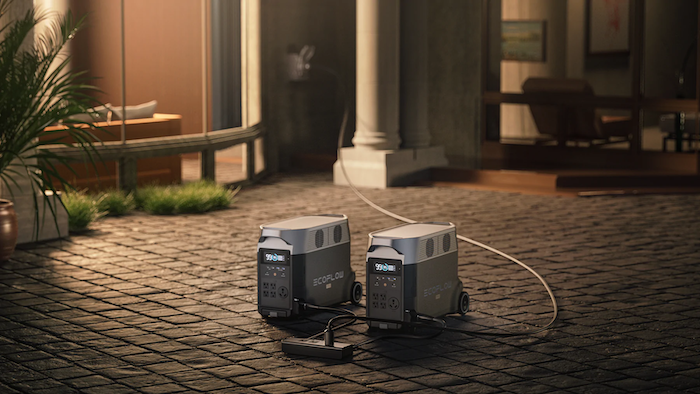Portable Power Station vs. Solar Generators: The Differences
Electricity powers nearly every aspect of our lives, from essential appliances like refrigerators and heaters to entertainment devices such as gaming consoles and laptops. No matter the device, we rely on electricity daily, making backup power solutions invaluable for ensuring uninterrupted access to energy.
However, not all backup power solutions function the same way. Two increasingly popular options are portable power stations and solar-powered generators—but what sets them apart?
This guide will break down the key differences, benefits, drawbacks, and best-use scenarios for portable power stations versus solar generators. By the end, you'll have the knowledge needed to make a confident and informed purchase.
What Is a Portable Power Station?
A portable power station (PPS) is a compact energy storage unit—an essential companion for adventurers who want to stay connected while on the go. Simply put, it functions like an oversized rechargeable battery, storing power for later use. The capacity of PPS units, typically measured in watt-hours, determines how much energy they can provide—the higher the watt-hour rating, the more devices it can power.
Portability varies by brand, so if ease of transport is a priority, always check the specifications. Even within the same brand, power stations come in different weights. For example, the EcoFlow DELTA Mini weighs just under 24 lbs (11 kg), while the EcoFlow DELTA Max is nearly double that at 48 lbs (22 kg).
In general, larger units offer greater power output. Before making a purchase, consider whether portability or power capacity is more important for your needs.


How Does a Portable Power Station Work?
A portable power station functions much like an oversized power bank—the kind you might use to recharge your phone in a pinch. However, unlike standard power banks, a PPS is capable of powering much more than just small devices; it can supply energy to larger home appliances such as refrigerators.
Charging a PPS is simple. You can connect it to a wall outlet or a car adapter, and some models, like those from EcoFlow, offer the option to attach a solar panel (sold separately) for sustainable energy replenishment. Depending on the brand, a PPS solution can reach full charge in under two hours, ensuring a quick and reliable power source whenever needed.
EcoFlow RIVER 2 Portable Power Station
The EcoFlow RIVER 2 is a prime example of a compact yet powerful portable power station. With a 256Wh capacity, it can charge 99% of consumer electronics, making it an excellent backup power solution. It offers three recharging methods—wall outlet, car adapter, or solar charging (solar panels sold separately or as part of a bundle to buy)—ensuring flexibility for any situation.
Weighing just 7.7 pounds (3.5 kg), the EcoFlow RIVER 2 is incredibly lightweight and perfect for camping trips or on-the-go power needs. Plus, its LFP battery technology ensures durability and produces zero greenhouse gas emissions, eliminating concerns about toxic fumes while delivering clean and reliable energy.
What Is a Solar Powered Generator?
Solar generators function similarly to portable power stations, with one key distinction—they generate their own energy. While a portable power station (PPS) only stores electricity, a solar generator actively produces power using solar panels.
Solar generators also use rechargeable batteries to store and provide energy when needed. In addition, one of the biggest draws is its versatility, letting you recharge your batteries just about anywhere because of how solar works. As long as you have the sun, solar panels can convert that sunlight into renewable energy;
EcoFlow solar generators are designed to be just as portable as traditional power stations. For example, the EcoFlow DELTA Mini + 110W solar panel combines the energy-storing unit with a lightweight, portable solar panel for on-the-go power generation.
How Does a Solar Powered Generator Work?
Whole home generators operate similarly to portable power stations when it comes to energy storage. The primary difference is that they integrate solar panels, which absorb sunlight, convert it into electricity, and store the energy for future use.
With EcoFlow solar generators, a built-in inverter transforms the stored solar energy into alternating current (AC), making it compatible with household appliances like refrigerators, laptops, and smartphones.
The power output varies depending on the model, as does the wattage capacity of the attachable solar panels. Choosing the right combination ensures you have sufficient energy to meet your specific needs.
EcoFlow DELTA Pro
For those seeking a powerful and reliable solar generator, the EcoFlow DELTA Pro paired with a 400W solar panel is an excellent choice. With a 3.6kWh capacity, expandable up to 25kWh, this generator can handle heavy-duty appliances, including refrigerators, TVs, and more.
Designed for off-grid living, camping, RV travel, and home backup, the EcoFlow DELTA Pro delivers plug-and-play power with its 400W solar panel. It provides a sustainable, high-performance energy solution for anyone looking to stay powered in any environment.
What Are the Differences Between a Portable Power Station and a Solar Powered Generator?
Portable power stations and solar generators share many similarities, but there are key differences that set them apart.
Power Storage vs. Power Generation
The primary distinction lies in how they handle energy. Portable power stations (PPS) store energy, while solar generators generate energy by converting sunlight through solar panels.
However, if you pair a portable power station with solar panels, you essentially create a solar generator setup. Pre-packaged solar generators bundle both components, offering a cost-effective way to get everything needed for renewable power generation.
Power Source
Portable power stations require an external energy supply to recharge their batteries. Usually, it requires a grid connection, but some also can connect to your vehicle using a car adaptor. You can attach solar panels, but you’ll need to purchase these separately.
Solar generators come ready-made. You can charge them using a wall outlet, car adaptor, or solar panels. For this reason, solar generators are far more versatile and allow you to go off-grid without worrying about how to source your power.
Portability
Due to the necessary addition of solar panels, generators tend to be a little heavier and larger than PPS systems. However, portability varies significantly.
A smaller model with solar panels will still be lighter than a more heavy-duty portable power station. Plus, with EcoFlow’s portable solar panels, you can fold up the panels for compact storage and transportation.
Should I Purchase a Portable Power Station or a Solar Powered Generator?
To close off our comparison, let’s talk about practicalities. Though both devices are handy for keeping you connected, there are specific scenarios where one has the edge over the other. If you’re looking for real-world examples, you’re in the right place. We have taken three scenarios and examined which product would better suit your needs. Let’s get into it!
Camping
Getting out into the great outdoors is wonderful, and one of the appealing factors of this may be ‘disconnecting’ for a little while. However, you’ll probably still need at least a little electricity for practical items such as portable cookers, phones, and GPS devices.
Your first thought might be a portable power station, given that you can take them anywhere. But we give the edge to solar. Since you’ll be outdoors so much,using a generator that gets its power from the sun makes sense. With solar, you know you will have enough energy to keep you going without needing access to the grid.
Home Backup
Blackouts aren’t fun for anybody, but they can be a little more bearable with the help of a generator. One of the worst things about a total power outage is its effect on your refrigerated and frozen food and your ability to complete routines you may ordinarily take for granted. We rely significantly on electricity, so we need a reliable backup plan when it’s gone.
For this purpose, we recommend a portable power station. These compact devices often pack enough wattage to run larger appliances, including refrigerators and freezers, so you don’t need to worry about losing food. The EcoFlow DELTA Pro boasts a power capacity of 3600Wh, enough to run household appliances and small electronic devices, and it’s easy to keep charged for when a blackout hits.
Outdoor Events
Planning the perfect outdoor event can be stressful. Whether it’s a wedding, a festival, or just an excuse to enjoy the summer, you want to ensure everything goes according to plan. This relies upon a power supply that won’t give up when you need it most.
With that in mind, we recommend a solar-powered generator. What better way could there be to power an outdoor event than by harnessing the power of the sun? You’re likely to be outside all day, and that’s the perfect condition for your solar generator.
The EcoFlow 160W solar panel is dust and water-resistant, too, so you don’t need to worry about any rainfall (or accidental drink spillages) affecting its performance.


Conclusion
So there you have it! Now you’re ready to go out into the wilderness (or plan the perfect event!) without worrying about how you will power it.
If you ever feel stuck, just remember that the critical difference between portable power stations and solar generators is the presence of a solar panel and the ability to generate power — not just store it. Beyond that, they are very similar!
No matter which product you opt for in the EcoFlow range, we are sure you will be impressed by its capabilities.
For press requests or interview opportunities, reach out to our media team
media.na@ecoflow.com